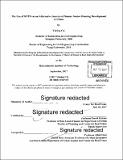| dc.contributor.advisor | David Geltner. | en_US |
| dc.contributor.author | Cai, Yiming, S.M. Massachusetts Institute of Technology | en_US |
| dc.contributor.other | Massachusetts Institute of Technology. Center for Real Estate. Program in Real Estate Development. | en_US |
| dc.coverage.spatial | a-cc--- | en_US |
| dc.date.accessioned | 2018-02-08T16:25:59Z | |
| dc.date.available | 2018-02-08T16:25:59Z | |
| dc.date.copyright | 2017 | en_US |
| dc.date.issued | 2017 | en_US |
| dc.identifier.uri | http://hdl.handle.net/1721.1/113485 | |
| dc.description | Thesis: S.M. in Real Estate Development, Massachusetts Institute of Technology, Program in Real Estate Development in conjunction with the Center for Real Estate, 2017. | en_US |
| dc.description | Cataloged from PDF version of thesis. | en_US |
| dc.description | Includes bibliographical references (pages 69-70). | en_US |
| dc.description.abstract | As China's elderly population grows at an accelerating rate, investors from a wide range of industries have entered the senior housing market and view it as a "sunrise industry" which can offer attractive returns for investors. Today, growth in China's senior housing market is presents both tremendous opportunities and challenges. On the other hand, due to the large capital required, long investment cycle and steady capital inflow toward the middle or the end of the projects, an alternative financing method is required to meet the rapid development of senior housing in China. REITs (Real Estate Investment Trusts), allowing anyone to invest in portfolios of large-scale properties through the purchase of stock, are a great alternative source for financing. This thesis reviews the background and current market of senior housing in China and discusses the key points in this industry, especially the ways of project to finance. Then, REITs are introduced in terms of history, pros and cons, valuation, and challenges. A case of a US leading health care REIT is conducted, with a comparison to the current quasi-REITs in China. Finally, the general strategy and structure of senior housing REITs are discussed. Based on this study, REITs clearly fit the current and future needs of senior housing sector in China. Although China's capital market is not completely ready to adopt REITs with international standards, China should pursue the experiment of such practice amid the challenges. | en_US |
| dc.description.statementofresponsibility | by Yiming Cai. | en_US |
| dc.format.extent | 70 pages | en_US |
| dc.language.iso | eng | en_US |
| dc.publisher | Massachusetts Institute of Technology | en_US |
| dc.rights | MIT theses are protected by copyright. They may be viewed, downloaded, or printed from this source but further reproduction or distribution in any format is prohibited without written permission. | en_US |
| dc.rights.uri | http://dspace.mit.edu/handle/1721.1/7582 | en_US |
| dc.subject | Center for Real Estate. Program in Real Estate Development. | en_US |
| dc.title | The use of REITs as an alternative source to finance senior housing development in China | en_US |
| dc.title.alternative | Use of Real Estate Investment Trusts as an alternative source to finance senior housing development in China | en_US |
| dc.type | Thesis | en_US |
| dc.description.degree | S.M. in Real Estate Development | en_US |
| dc.contributor.department | Massachusetts Institute of Technology. Center for Real Estate. Program in Real Estate Development. | en_US |
| dc.contributor.department | Massachusetts Institute of Technology. Center for Real Estate | |
| dc.identifier.oclc | 1019907950 | en_US |
